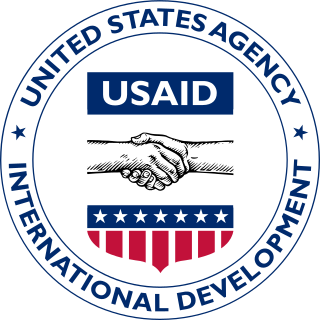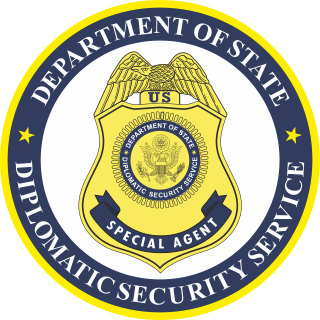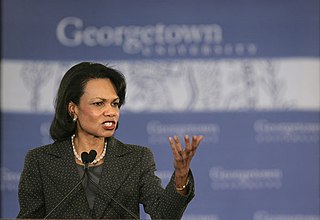
The United States Department of State (DOS), or simply the State Department, is an executive department of the U.S. federal government responsible for the country's foreign policy and relations. Equivalent to the ministry of foreign affairs of other nations, its primary duties are advising the U.S. president on international relations, administering diplomatic missions, negotiating international treaties and agreements, and representing the U.S. at the United Nations. The department is headquartered in the Harry S Truman Building, a few blocks from the White House, in the Foggy Bottom neighborhood of Washington, D.C.; "Foggy Bottom" is thus sometimes used as a metonym.

The United States Agency for International Development (USAID) is an independent agency of the U.S. federal government that is primarily responsible for administering civilian foreign aid and development assistance. With a budget of over $27 billion, USAID is one of the largest official aid agencies in the world and accounts for more than half of all U.S. foreign assistance—the highest in the world in absolute dollar terms.

The United States Foreign Service is the primary personnel system used by the diplomatic service of the United States federal government, under the aegis of the United States Department of State. It consists of over 13,000 professionals carrying out the foreign policy of the United States and aiding U.S. citizens abroad. The current director general is Marcia Bernicat.

The Diplomatic Security Service is the principal security and law enforcement agency of the United States Department of State. As the operational division of State Department's Bureau of Diplomatic Security, its primary mission is to protect diplomatic assets, personnel, and information and to combat visa and passport fraud. DSS also undertakes counterterrorism, counterintelligence, cybersecurity and criminal investigations, both domestically and abroad.
Diplomatic rank is a system of professional and social rank used in the world of diplomacy and international relations. A diplomat's rank determines many ceremonial details, such as the order of precedence at official processions, table seatings at state dinners, the person to whom diplomatic credentials should be presented, and the title by which the diplomat should be addressed.

American Foreign Service Association (AFSA), established in 1924, is the professional association of the United States Foreign Service. With over 15,000 dues-paying members, American Foreign Service Association represents 28,000 active and retired Foreign Service employees of the Department of State and Agency for International Development (AID), as well as smaller groups in the Foreign Agricultural Service (FAS), Foreign Commercial Service (FCS), and International Broadcasting Bureau (IBB).

The Foreign Service Institute (FSI) is the United States federal government's primary training institution for employees of the U.S. foreign affairs community, preparing American diplomats as well as other professionals to advance U.S. foreign affairs interests overseas and in Washington. FSI provides more than 800 courses—including up to 70 foreign languages—to more than 225,000 enrollees a year from the U.S. Department of State and more than 50 other government agencies and the military service branches. FSI is based at the George P. Shultz National Foreign Affairs Training Center in Arlington, Virginia.
Foreign Service Specialists are direct-hire career employees of the United States Department of State and other foreign affairs agencies. They are members of the United States Foreign Service who provide important technical, support or administrative services in 19 career categories, including Diplomatic Security Agents, Doctors and Physician Assistants, Information Management Specialists, Office Management Specialists, Human Resource Specialists. They serve in over 290 Embassies or Consulates abroad, Washington, D.C. or other locations in the continental United States.

The Department of Foreign Affairs is the executive department of the Philippine government tasked to contribute to the enhancement of national security, protection of the territorial integrity and national sovereignty, to participate in the national endeavor of sustaining development and enhancing the Philippines' competitive edge, to protect the rights and promote the welfare of Filipinos overseas and to mobilize them as partners in national development, to project a positive image of the Philippines, and to increase international understanding of Philippine culture for mutually-beneficial relations with other countries.
A-100 is the colloquial name given to the introductory/orientation training class for incoming Foreign Service Officers. These courses are taught in the Foreign Service Institute at the National Foreign Affairs Training Center in Arlington, Virginia. The purpose of the class is to provide orientation to the United States Department of State, information on embassy operation and foreign affairs, intelligence collection and dissemination, State Department computer systems, and the roles different categories of personnel perform in the conduct of diplomacy. It is the basic job-orientation course for the United States Foreign Service before diplomats branch off into different career tracks or geographic specialties.

Transformational Diplomacy is a diplomacy initiative championed by former United States secretary of state Condoleezza Rice for reinvigorating American Foreign Policy and the United States Foreign Service.
The United States Department of State, like other agencies of the U.S. federal government, gives civilian decorations for outstanding service, sacrifice, or heroism. The criteria for the awards are set down in 3 FAM 4820 - Foreign Affairs Manual, 3 FAM - Personnel, section 3 FAM 4800 Department Awards Program.

There is a U.S. Embassy in Guatemala located in Guatemala City. According to the United States Department of State, relations between the United States and Guatemala have traditionally been close, although sometimes they are tense regarding human, civil, and military rights.

The United States established official relations with Nepal in 1947 and opened its Kathmandu embassy in 1959. Relations between the two countries have always been friendly. U.S. policy objectives toward Nepal center on helping Nepal build a "peaceful, prosperous, and democratic society."
The Senior Foreign Service (SFS) comprises the top four ranks of the United States Foreign Service. These ranks were created by the Foreign Service Act of 1980 and Executive Order 12293 in order to provide the Foreign Service with senior grades equivalent to general and flag ranks in the military and naval establishments, respectively, and to grades in the Senior Executive Service. Like military ranks and other Foreign Service ranks, the Senior Foreign Service grade system assigns rank in person, not rank in position.

Earl Anthony Wayne is an American diplomat. Formerly Assistant Secretary of State for Economic and Business Affairs, Ambassador to Argentina and Deputy Ambassador to Afghanistan, Wayne served nearly four years as Ambassador to Mexico. He was nominated by President Obama and confirmed by the Senate in August, 2011. He departed Mexico City for Washington July 31, 2015 and retired from the State Department on September 30, 2015. Wayne attained the highest rank in the U.S. diplomatic service: Career Ambassador. He is currently a Diplomat in Residence at American University's School of International Service and works with the Woodrow Wilson International Center for Scholars, the Atlantic Council, the Center for Strategic and International Studies, and as an independent consultant, speaker and writer. Wayne worked as an adviser for HSBC Latin America on improving management of financial crime risk from 2015 until 2019 and with the American Foreign Service Association from 2017 to 2019.

The Quadrennial Diplomacy and Development Review (QDDR) is a study by the United States Department of State, conducted beginning in 2009 and intended to be done every four years, that analyzes the short-, medium-, and long-term blueprint for the United States' diplomatic and development efforts abroad. It seeks to plan on a longer-term basis than the usual year-to-year, appropriations-based practice, and to integrate diplomacy and development missions. It similarly seeks to correlate the department’s missions with its capacities and identify shortfalls in resourcing. Finally, it is a precursor to core institutional reforms and corrective changes. The first review was completed by the end of 2010. A second review began during 2014 and was released in April 2015. No further reviews have taken place.

The Thomas Jefferson Star for Foreign Service is an award of the United States Department of State. It is presented to employees of State, USAID, and civilian contractors assigned to diplomatic and consular facilities for events that lead to death or serious illness or injury. It is roughly comparable to the U.S. military's Purple Heart, but since the criteria for the award is so strict, nearly all of them are awarded posthumously.
African-Americans in foreign policy in the United States catalogs distinguished African Americans who have and continue to contribute to international development, diplomacy, and defense through their work with the U.S. Department of State, the U.S. Agency for International Development, the U.S. Information Agency, and the U.S. Congress, and other notable agencies and non-governmental organizations. The creators acknowledge the presence of the interagency contributions to the foreign affairs realm, and welcome additional content to showcase the achievements of African-Americans in other relevant USG agencies.

The Dissent Channel is a messaging framework open to Foreign Service Officers and other U.S. citizens employed by the United States Department of State and Agency for International Development (USAID), through which they are invited to express constructive criticism of government policy.













